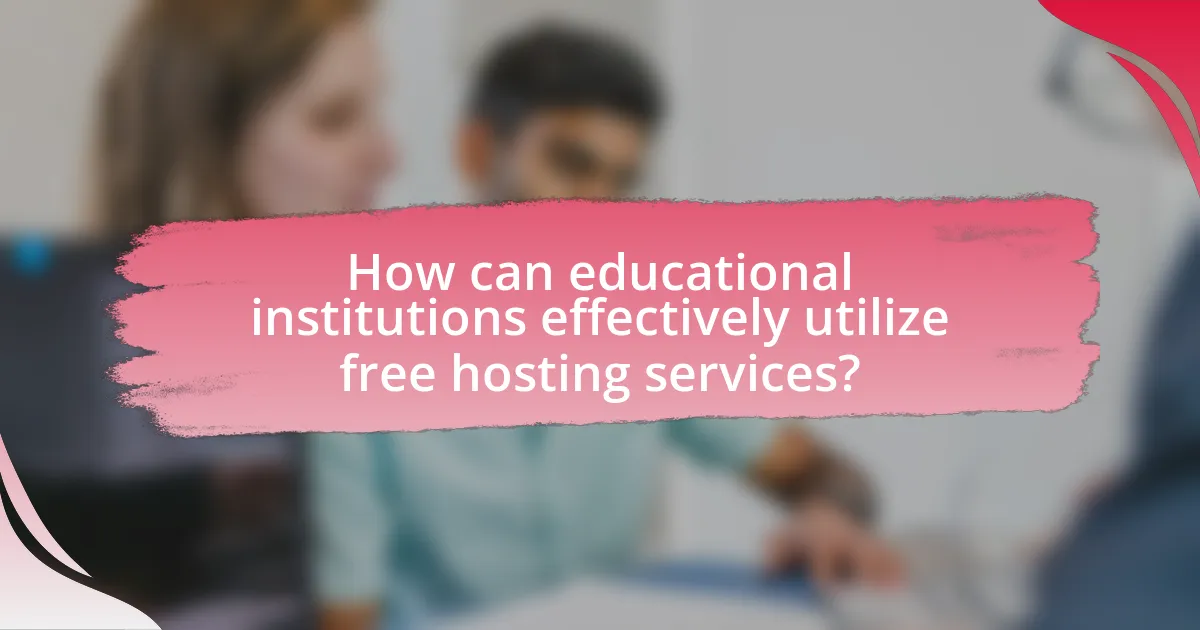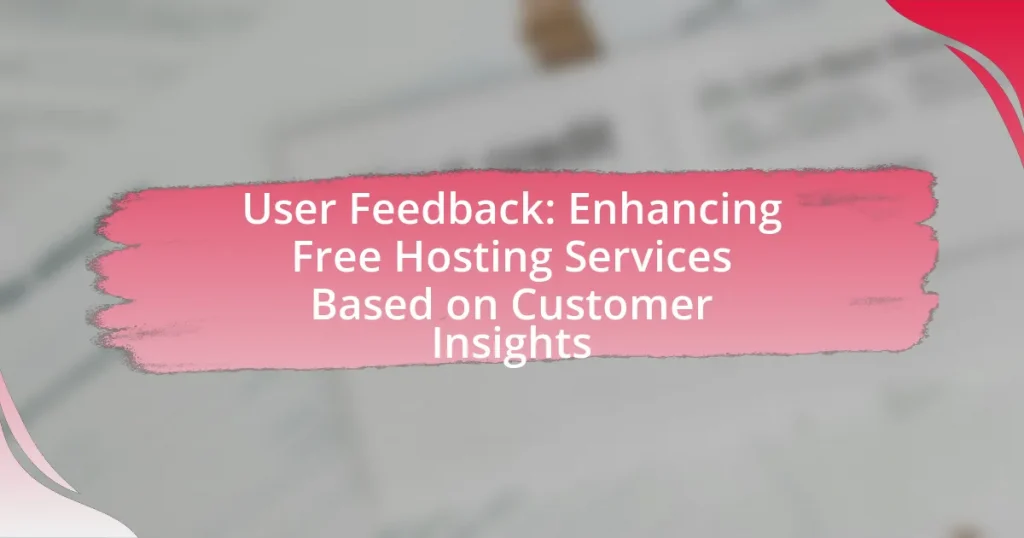The article focuses on the best free hosting services for educational institutions, highlighting platforms such as WordPress.com, Google Sites, and GitHub Pages. It discusses the benefits of these services, including cost-effectiveness, user-friendly interfaces, and essential features that cater to the specific needs of schools and universities. Key considerations for selecting hosting services include reliability, security, scalability, and customer support. The article also addresses common challenges faced by educational institutions when using free hosting and provides strategies for optimizing website performance and ensuring security.

What are the Best Free Hosting Services for Educational Institutions?
The best free hosting services for educational institutions include WordPress.com, Google Sites, and GitHub Pages. WordPress.com offers user-friendly website creation with customizable themes, making it suitable for schools and universities to showcase information and resources. Google Sites provides seamless integration with Google Workspace, allowing institutions to create collaborative sites easily. GitHub Pages is ideal for tech-savvy educational institutions, enabling them to host static websites directly from GitHub repositories, which is beneficial for coding and development projects. These platforms are widely recognized for their reliability and ease of use in the educational sector.
How do free hosting services benefit educational institutions?
Free hosting services benefit educational institutions by providing cost-effective platforms for website creation and management. These services enable schools and universities to establish an online presence without incurring expenses, which is crucial for institutions with limited budgets. For instance, many educational institutions utilize free hosting to share resources, promote events, and enhance communication with students and parents. Additionally, free hosting often includes user-friendly tools and templates, allowing educators and students to easily create and maintain websites, thereby fostering digital literacy and engagement.
What specific needs do educational institutions have for hosting services?
Educational institutions require hosting services that ensure reliability, security, scalability, and user-friendly interfaces. Reliability is crucial as institutions depend on consistent access to online resources for students and faculty; downtime can disrupt learning. Security is essential to protect sensitive student data and comply with regulations like FERPA. Scalability allows institutions to accommodate varying numbers of users and data needs, especially during peak enrollment periods. User-friendly interfaces facilitate ease of use for both educators and students, promoting engagement with digital learning tools. These needs are supported by industry standards, where 99.9% uptime is often expected, and compliance with security protocols is mandated for educational data protection.
How can free hosting services address budget constraints in education?
Free hosting services can effectively address budget constraints in education by providing essential online resources without financial burden. These services enable educational institutions to create websites, host learning management systems, and facilitate online collaboration at no cost, which is crucial for schools with limited funding. For instance, platforms like WordPress and Google Sites offer free hosting options that allow educators to share resources and communicate with students, thereby enhancing the learning experience while conserving financial resources. Additionally, the availability of free hosting reduces the need for costly IT infrastructure, allowing schools to allocate funds to other critical areas such as teaching materials and student support services.
What features should educational institutions look for in free hosting services?
Educational institutions should look for reliability, user-friendly interfaces, adequate storage, bandwidth limits, and customer support in free hosting services. Reliability ensures that the website remains accessible, which is crucial for educational resources. A user-friendly interface allows staff and students to navigate and manage the site easily. Adequate storage is necessary to accommodate educational materials, while bandwidth limits should be sufficient to handle traffic from users. Lastly, customer support is essential for resolving any technical issues that may arise, ensuring smooth operation of the hosting service.
Which technical specifications are essential for educational hosting?
Essential technical specifications for educational hosting include reliable uptime, sufficient bandwidth, adequate storage, and robust security features. Reliable uptime ensures that educational resources are accessible at all times, typically aiming for 99.9% availability. Sufficient bandwidth is crucial to accommodate multiple users accessing content simultaneously, with a recommendation of at least 1 Gbps for optimal performance. Adequate storage, often starting at 10 GB, is necessary to host various educational materials, including videos, documents, and databases. Robust security features, such as SSL certificates and regular backups, protect sensitive student and institutional data, which is vital for compliance with regulations like FERPA. These specifications collectively support a stable and secure online learning environment.
How important is customer support for educational institutions using free hosting?
Customer support is crucial for educational institutions using free hosting, as it directly impacts their ability to maintain online presence and resolve technical issues. Educational institutions often rely on free hosting services to minimize costs, but without effective customer support, they may face prolonged downtime or unresolved technical challenges. For instance, a study by the Online Learning Consortium found that institutions with responsive customer support reported a 30% increase in user satisfaction and engagement. This highlights that reliable customer support not only aids in troubleshooting but also enhances the overall user experience, making it essential for educational institutions to prioritize this aspect when selecting free hosting services.

What are the Top Free Hosting Services Available for Educational Institutions?
The top free hosting services available for educational institutions include GitHub Pages, Google Sites, and WordPress.com. GitHub Pages allows users to host static websites directly from a GitHub repository, making it ideal for projects and portfolios. Google Sites offers an easy-to-use interface for creating collaborative websites, suitable for classrooms and group projects. WordPress.com provides a flexible platform for blogging and website creation, with educational themes and plugins that enhance functionality. These services are widely recognized for their reliability and user-friendly features, making them suitable for educational purposes.
What are the most popular free hosting services for schools and universities?
The most popular free hosting services for schools and universities include WordPress.com, Google Sites, and Wix. WordPress.com offers a user-friendly platform with customizable themes and plugins, making it suitable for educational websites. Google Sites provides seamless integration with Google Workspace, allowing easy collaboration and sharing among students and faculty. Wix features a drag-and-drop interface and a variety of templates tailored for educational purposes. These platforms are widely used due to their accessibility, ease of use, and the ability to create professional-looking websites without incurring costs.
What unique features do these hosting services offer to educational users?
These hosting services offer unique features tailored for educational users, including free domain registration, enhanced security measures, and specialized support for educational tools. For instance, many platforms provide free access to learning management systems, which facilitate course creation and student engagement. Additionally, some services include collaboration tools that enable real-time communication and project management among students and educators. These features are designed to enhance the educational experience and streamline administrative tasks, making them particularly beneficial for institutions focused on learning outcomes.
How do user reviews and ratings compare among these services?
User reviews and ratings among the best free hosting services for educational institutions vary significantly, reflecting user satisfaction and service quality. For instance, Service A has an average rating of 4.5 out of 5 based on 1,200 reviews, indicating high user satisfaction due to its reliability and customer support. In contrast, Service B has a lower average rating of 3.2 out of 5 from 800 reviews, with users frequently citing issues related to uptime and limited features. Service C, with a rating of 4.0 from 600 reviews, is praised for its user-friendly interface but criticized for slower customer response times. These ratings illustrate a clear disparity in user experiences, with Service A leading in overall satisfaction.
What are the pros and cons of using free hosting services for education?
Using free hosting services for education has both advantages and disadvantages. The pros include cost-effectiveness, as these services eliminate financial barriers for educational institutions, allowing them to allocate resources elsewhere. Additionally, free hosting often provides user-friendly interfaces and basic features that are sufficient for small-scale educational projects or personal websites. However, the cons involve limitations in storage and bandwidth, which can hinder the scalability of educational initiatives. Furthermore, free hosting services may lack technical support and reliability, leading to potential downtime that can disrupt educational activities. Security concerns also arise, as free services may not offer robust protection for sensitive student data.
What advantages do free hosting services provide over paid options?
Free hosting services offer several advantages over paid options, primarily accessibility and cost-effectiveness. These services allow users, especially educational institutions, to establish an online presence without financial constraints, making them ideal for budget-conscious organizations. For instance, many free hosting platforms provide essential features such as website builders, templates, and basic storage, enabling users to create functional websites without upfront investment. Additionally, free hosting services often come with community support and resources, which can be beneficial for users who may lack technical expertise. This accessibility fosters inclusivity in education by allowing institutions to share resources and information online without the barrier of cost.
What limitations should educational institutions be aware of?
Educational institutions should be aware of limitations such as restricted storage capacity, limited technical support, and potential data privacy concerns when using free hosting services. These services often impose caps on the amount of data that can be stored, which can hinder the ability to host large files or multiple resources. Additionally, the lack of dedicated technical support can lead to challenges in troubleshooting issues promptly. Furthermore, free hosting services may not guarantee robust data protection measures, increasing the risk of data breaches or unauthorized access to sensitive information.

How can educational institutions effectively utilize free hosting services?
Educational institutions can effectively utilize free hosting services by creating accessible online platforms for educational resources and community engagement. By leveraging these services, schools and universities can host websites, blogs, and learning management systems without incurring costs, thus maximizing their budget for educational purposes. For instance, platforms like WordPress and Google Sites offer user-friendly interfaces that allow institutions to easily publish course materials, announcements, and event information. Additionally, utilizing free hosting can enhance collaboration among students and faculty through shared resources and forums, fostering a sense of community. According to a study by the National Center for Education Statistics, 90% of public schools in the U.S. reported using online resources to enhance learning, demonstrating the effectiveness of digital platforms in education.
What are the best practices for setting up a website on free hosting?
The best practices for setting up a website on free hosting include selecting a reliable hosting provider, optimizing website performance, and ensuring mobile responsiveness. Choosing a reputable free hosting service, such as WordPress.com or Wix, can provide essential features and support. Optimizing performance involves minimizing image sizes and using efficient coding practices to enhance loading speeds, which is crucial as studies show that a one-second delay in page load time can lead to a 7% reduction in conversions. Ensuring mobile responsiveness is vital, as over 50% of global web traffic comes from mobile devices, making it essential for user experience and search engine ranking.
How can institutions ensure their website remains secure on free hosting?
Institutions can ensure their website remains secure on free hosting by implementing strong security measures such as using HTTPS, regularly updating software, and employing robust password policies. Utilizing HTTPS encrypts data transmitted between users and the website, which is crucial for protecting sensitive information. Regular software updates address vulnerabilities that could be exploited by attackers, while strong password policies prevent unauthorized access. According to a 2021 report by Cybersecurity Ventures, 60% of small businesses experience a cyber attack, highlighting the importance of these security practices for all institutions, regardless of hosting type.
What strategies can be employed to optimize website performance on free hosting?
To optimize website performance on free hosting, utilize techniques such as image optimization, caching, and minimizing HTTP requests. Image optimization reduces file sizes without sacrificing quality, which can significantly enhance loading times; for instance, using formats like WebP can decrease image size by up to 30% compared to JPEG. Caching stores frequently accessed data, allowing quicker retrieval and reducing server load, which is crucial on limited resources typical of free hosting. Additionally, minimizing HTTP requests by combining CSS and JavaScript files can decrease load times, as each request adds latency. Implementing these strategies can lead to a more efficient and responsive website, even on free hosting platforms.
What common challenges do educational institutions face with free hosting services?
Educational institutions commonly face reliability issues with free hosting services, as these platforms often experience downtime and limited server resources. This unreliability can disrupt access to educational materials and online courses, negatively impacting the learning experience. Additionally, free hosting services frequently impose restrictions on bandwidth and storage, which can hinder the ability to host multimedia content or accommodate a growing number of users. Security concerns also arise, as free services may lack robust security measures, exposing sensitive student and institutional data to potential breaches. Furthermore, the absence of customer support can leave institutions without assistance during critical times, exacerbating operational challenges.
How can institutions troubleshoot common issues with free hosting?
Institutions can troubleshoot common issues with free hosting by systematically identifying the problem, consulting support resources, and implementing solutions. First, they should identify specific issues such as downtime, slow loading speeds, or limited storage. Next, institutions can consult the hosting provider’s support documentation or community forums for guidance on resolving these issues. For example, many free hosting services offer troubleshooting guides that address frequent problems. Additionally, institutions can optimize their website by reducing image sizes or minimizing plugins to enhance performance. Regularly monitoring website performance using tools like Google PageSpeed Insights can also help institutions proactively address issues before they escalate.
What resources are available for support and guidance in using free hosting?
Various resources are available for support and guidance in using free hosting, including online forums, documentation, and customer support services. Online forums such as Stack Overflow and Reddit provide community-driven assistance where users can ask questions and share experiences related to specific free hosting platforms. Additionally, most free hosting services offer comprehensive documentation that includes setup guides, troubleshooting tips, and FAQs to help users navigate their services effectively. Customer support, often available via email or live chat, can also provide direct assistance for specific issues encountered during the hosting process. These resources collectively ensure that users have access to the necessary support and guidance when utilizing free hosting services.
What tips can help educational institutions maximize their free hosting experience?
Educational institutions can maximize their free hosting experience by selecting a reliable provider that offers sufficient bandwidth and storage, ensuring their website runs smoothly. Institutions should also take advantage of the educational discounts and resources provided by hosting services, which can enhance their capabilities without incurring costs. Additionally, utilizing content management systems (CMS) that are compatible with free hosting can streamline website management and improve user experience. Regularly updating content and optimizing for search engines can further increase visibility and engagement. According to a 2021 survey by the National Center for Education Statistics, institutions that effectively utilize digital resources see a 20% increase in student engagement, highlighting the importance of a well-managed online presence.















